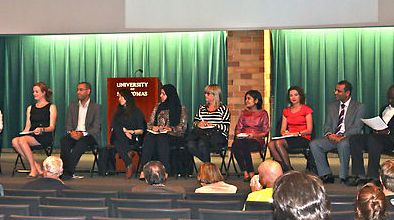Ethar El Katatney, a freelance journalist from Cairo, Egypt, spoke at a discussion forum Tuesday night about how journalists in other countries do not have the same freedom of press as those in the U.S.
“I don’t even have a press card because it makes no difference,” she said. “If I’m in a protest; I’m a protester, there is no such thing as, ‘I’m a journalist I have a right to be here.’”
Katatney and nine other journalists from the World Press Institute came to St. Thomas to discuss their impressions of U.S. journalism. The WPI journalists visited the U.S. for two months to learn about journalism and lived at St. Thomas for four weeks.
The journalists came from 10 countries including Brazil, India, China, Uganda and Australia. The journalists have been in the U.S. since mid-August and will return home at the end of this week.
Kris Bunton, interim associate dean, said this is the second year that the WPI has visited St. Thomas.
“It promotes and strengthens press freedom around the world by bringing journalists here to the United States and having them participate in seminars and travel all over the country to meet a variety of journalists, policy makers and politicians,” Bunton said.
The journalists answered questions submitted by St. Thomas students at the panel. They were asked a variety of questions about their experiences in America, including differences between media in their countries and the U.S., and which city they would visit again.
Siobhan Heanue from Australia shared her thoughts on U.S. news coverage of “soft stories” and celebrity news.
“Journalists in the U.S. are much safer than journalists in a lot of countries represented here, but what comes with that security is laziness,” she said. “It’s not purely ratings driven. I believe that when you don’t have to struggle for your stories, and you don’t fight the apparatuses of power, then it is easier to fall back into the track of telling those soft stories and those superficial tales.”
Bunton moderated the discussion and pointed out that females dominate the U.S. journalism field and asked whether other countries are experiencing this same trend.
The WPI journalists agreed that even in patriarchal countries, females are still dominant in journalism.
Alexandre Rodrigues Jorge, a reporter from Brazil, said that the editor-in-chief of his newspaper is a female.
“In Brazil, we also have more women in the newsrooms everywhere,” he said. “What I’ve noticed is that they have been developing their great ability to be bosses, to lead the teams.”
Lin Meilan, reporter and section editor for a Beijing Newspaper, said that they are in great need of male reporters in China.
“My boss once said he would hire any male journalist who is not disabled because they are so desperate,” she said.
Andra Miron, executive producer of a TV news channel in Moldova, said she enjoyed learning about U.S. media resources but realizes that she will not have these resources when she returns home.
“It’s like you enter a Gucci shop or a Versace shop, you put on a dress, you look in the mirror and you look gorgeous in it, but you have to take it back and get out of the store,” she said. “That’s how I feel now after seeing the resources. I know what they are about now, but I have to do my own thing back home.”
Madeline Carlson can be reached at carl8801@stthomas.edu

